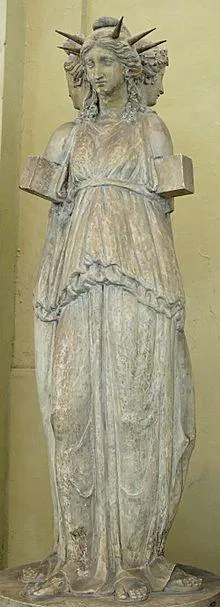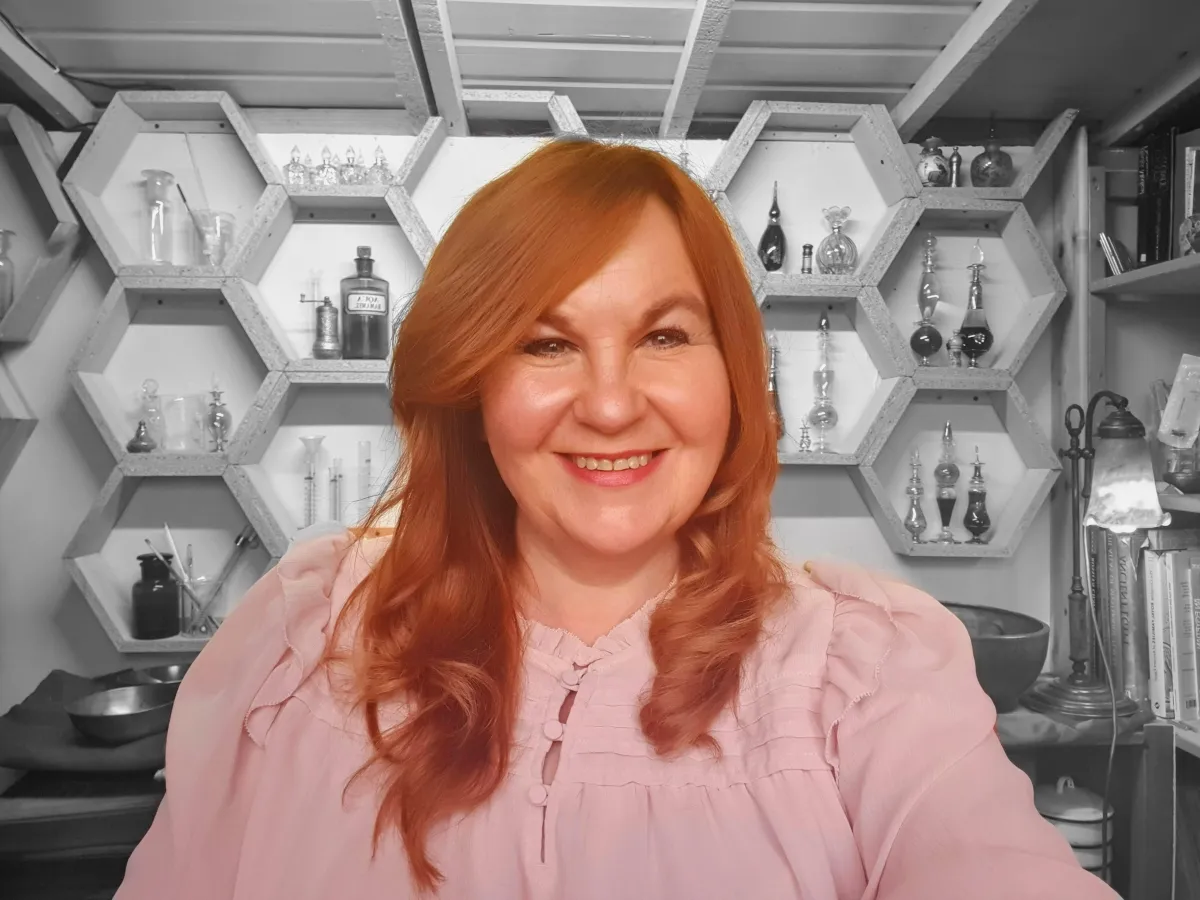Ancient Greek Mystery School
How to Design Devotional Offerings For Hecate
with essential oils

How to Create Devotional Offerings For Hecate with essential oils
A Five week Course on wednesdays 7-8.30pm GMT
Begins June 4th 2025
Jointly Presented by Elizabeth Ashley and Rowan Seegars
In ancient Greece, one of the most important skills to perfect was the logos; the word of the gods. Perhaps not how the words were incanted, but the way they were performed, because words are open to misinterpretation and are selective to one’s mother tongue. However scent associations are universal. They direct the mind with cultural associations and memories, through chemical changes they bring in the body, and with neurological interactions with neurotransmitters.
Fragrance mediates silent conversations between humankind and the invisible forces around them. Ancient temples were suffused with scent to help evoke the sense of the divine and to create an atmosphere of ritual invocation. Cicero describes how the statue of the goddess Artemis was anointed with ointments and fragrant oils. Temple inscriptions from Delos reveal that the priestesses of their island’s sanctuaries cared for the images of the goddesses by anointing them with rose infused olive oil.
A temple to Athena at Elis, near Olympia, housed a great image of the goddess made from gold and ivory. These so-called chryselephantine statues were protected from the elements with beeswax polish. When Panaenus decorated the sanctuary in 448BC, he was said to have painted frescoes onto the plaster walls with milk and saffron. When Pausanius wrote about his visit to her, 500 years later, he could still smell the fragrance.
The aromatic character of the divine suffused the atmosphere, and brought the goddess to life. It must have felt like you were bathed in the aura of gold!
So, how do we bring Hecate statues to life?
How do we choose offerings for Hecate, to please her enough to draw near? With a deity as complex as the goddess, Hecate, how can we ensure we invoke the best aspect?

Three Hecate Epithets
Three Hecate Epithets
There are a variety of Hecate epithets. While we will refer to several of them throughout the course, we will focus deeply on three. Each class will be split into half. In the first part, Rowan will reveal the hidden aspects of the goddess powers, Hecate's symbols and the history we know about them. In the second half, we’ll investigate oils and fragrances that can help evoke and invoke a different Hecate goddess aspect.
So we’ll meet the goddess Hecate in the three following guises.
Krokopeplos:
‘Saffron Clad’ or ‘Saffron veiled’.
The color of the sanctified priesthood and perhaps, Her celestial aspects.
Kourotrophos
Her nurturing aspect, protectress in childbirth of infants and children.
Tymbidia
Her cthonic aspect, as she dances in tombs with the souls of the dead.
A Five Part Course
This class is designed with a steep learning curve, understanding that there will be a wide range of abilities and experience here. Given the dual nature of the subject matter - goddess and scent - we will take participants from very basic knowledge about Hecate, and about essential oils quite quickly, through the course. We will address the safety associated with each essential oil individually, so there is no need for either prior knowledge about the goddess or about aromatherapy.
It should be stressed that, while this class is designed to be about devotions to Hecate, the techniques learned about using scent to make Hecate offerings can be used as a template to make offerings for other deities of your choice.
Offerings for Hecate Class 1
Lesson 1 Who is the goddess Hecate?
In this first class, Rowan will introduce us to an overview of the goddess, Hecate. We’ll discuss how different people have seen her throughout history and what her powers are thought to be. We’ll investigate her rulerships, the different dimensions of the goddess and the different things she has been called upon to help with through time.
Lesson 1 Part II Scent In The Temple
In Part II of the Offerings for Hecate Class 1, we’ll consider the different relationship that the priest or priestess would formerly have had with the holy image. (Ordinarily priestesses served goddesses, but the cult of Hecate was headed up by a eunuch priest.)
Saffron contains approximately 15,000 stamens per kilo, which requires around 400 man hours to pick. One can only imagine how many were needed to paint such a fresco. So where did all the money come from for these incredible statues, for their ornamentation, and most importantly, why did they feel it was important to do it?
How was a sacred statue perceived in ancient Greece? What more can we percieve than just the limestone, because in the past, the stone image of the goddess was seen as a living breathing thing.
How can we use what we learn about the past, to fine tune our devotions and offerings for Hecate today?
How can we take these understandings of each of Hecate's epithets to integrate them into magical practice? Yes, we anoint the statue, but also how we can use our knowledge to create protective amulets and talisman jewelry that suit the situations we find ourselves in.
How do we take a simple essential oil recipe to make it powerful enough to transform our magical tools?
Please note that Parts I & II happen on the same evening, as part of the same class.
Offerings for Hecate Class 2
Lesson 2 Offerings For Hecate Krokopeplos: ‘Saffron Clad’
Saffron essential oil is both rare and breathtakingly expensive, so what other ways could we recreate that golden aura? How do we generate a feeling of being 'with', and being 'of' Someone that is 'Saffron-Clad'.
This aspect of working with Hecate really also refers to the labours involved in actually sanctifying something, to the time and concentration it takes to set something apart.
Rgis is where we'll think about ritual purifications and sacred anointing.
Offerings for Hecate Class 3
Lesson 3 Offerings for Hecate Kourotrophos
Learn how to invoke the aspect of kourotrophos, but also how to be a vessel for her healing.
How do we allow the medicine of Hecate Kourotrophos to flow through our hands, safely and effectively?
Interestingly, Hekate’s herbs are often poisonous, hallucinogenic or somehow toxic…an absolute no-no when working in a realm where she is imagined as taking care of children. So we’ll not only look at which botanicals would work nicely, but also think about the relevant safety of each plant.
Offerings for Hecate Class 4
Lesson 4 Designing Your Own Offerings for Hecate Tymbida
At the Eleusinian Mysteries, Hecate was seen as leading Persephone back up from the underworld.
In post-Christian writings like the Chaldean Oracles, she was referred to as "Soteira", which is "saviour" or "helper".
She was said to frequent graveyards, crossroads and boundary places. Able to move between the realms, she is comfortable with the dead.
In this lesson we’ll look at plants connected to the underworld and dead, but also ones that can support us in being able to speak to those who have passed.
Necessarily in this class, we’ll look at protections using essential oils, as well as psychopomp oils and how to use Hecate's sigil to make amulets for protection.
Offerings for Hecate Class 5
Practical session
Choosing from one of the three Hecate epithets, you will create your own offering to Hecate with support from Rowan and Liz.
Who is This Course For?
Mainly, but not exclusively, devotees of the goddess Hecate
Anyone interested in how to better create offerings for any divinity
People looking to better tend their altar
Benefits of Doing This Course
Learn from two extremely experienced facilitators
Understand how to use plants for their physiological properties (in childbirth, for example)
Discover how to move consciousness between the realms.
Become better acquainted with Hecate
Feel her manifest in your temple
See your spiritual and magical practices transformed
Workshop Dates
The live, interactive classes are on Wednesdays 7-8.30 pm GMT on the following dates.
Offerings to Hecate Week 1 - 4th June
Offerings to Hecate Week 2 11 June
Offerings to Hecate Week 3 18 June
Offerings to Hecate Week 4 25th June
Offerings to Hecate Week 5 2nd July
Cost of the five week course: £350
Evergreen recordings of each week will be loaded up to your personal portal of the Scent Sorcerers Area of the Aromatic Mystery School, 3 days after the class. These are perfect for revising and referring back to each time you'd like to make a blend, or to simply to catch up if you are unable to make any of the classes in person.
Your Tutors For The Offerings for Hecate Class
Rowan Seegars
Elizabeth Ashley


About Rowan Seegars
An avid student of religion and the esoteric, Rowan’s spiritual journey began at a young age, sparked by the magic he felt in the names of ancient gods. Over the past two and a half decades, he has delved deeply into multiple cultures, methodologies, and traditions, cultivating a rich fabric of theoretical knowledge and practical experience.
Rowan’s devotion to the goddess Hekate began in his teenage years as he navigated the paths of spirituality and the occult. Over time, this devotion has flourished into the development of a mystical theology centered around her worship which integrates his experiences with contemporary polytheistic and animist religions. While rooted in historic practices, his approach focuses on ensuring these traditions remain vibrant and relevant in the modern world, striving to keep them meaningful, practical, applicable, and alive.
Through his work, Rowan helps others deepen their understanding of how the gods manifest in the world and within their own lives, encouraging practices that honor a sacred reciprocity. His approach creates a bridge between ancient civilizations and contemporary practitioners, proposing fresh perspectives on iconography, ritual, offerings, and worship.
About elizabeth Ashley
Elizabeth Ashley has been working with essential oils since the age of 8...that's more years than you should try counting.
She has many specialisms within the Clinical Aromatherapy field, but her passion is using scent to make people feel different as they move in and out of liminal spaces.
A Melissa bee priestess, a plant shaman, and a student of Classical Studies. She is uniquely skilled to train people to use fragrance as a means of accessing the past, the future and divinity.
We look forward to welcoming you to this Aromatic Mystery School Class to learn how to create devotional offerings for Hecate with essential oils.
